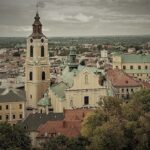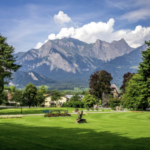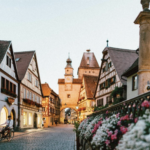Our planet has a rich culture and fascinating history. Please allow me to share my international travel journal with you on this blog.
-
The beauty of Belgium (international travel journal – Entry 1):
Flanders, in the European country, Belgium, famed for its medieval cities and motorways that can be seen from space, is one of the most urban corners of Europe. Yet, this densely populated area is seeing a mini-boom in a new type of agriculture where farmers sell direct to consumers. The movement, known as community-supported agriculture, is the antithesis of the sprawling global distribution chains of modern industrial food production. CSA farming means no supermarkets, no fertilizers and no monoculture.
Advocates say the most important feature is the direct link to consumers, who pay upfront and often pick the produce from the fields. This model of farming – sometimes referred to as farm-to-fork – originated in the United States and the Netherlands, but has quickly taken off in the Belgian region of Flanders.
Since 2007, at least 45 similar businesses have sprung up in the region. Koen Tierens, a plant biologist, is one of the newest on the scene. Tierens swapped his desk job as an agrarian expert for the 5.30am harvests that come with running his own vegetable farm. He has a 1.2-hectare (2.96-acre) plot in the village of Kampenhout just outside Brussels, where the rich, loamy soil is ideal for growing.
Tierens’ father, a retired farmer, was skeptical when he outlined his plans; a small holding, no fertilizers and a few old-fashioned, second-hand tools: “My father told me, ‘Koen what are you doing? You studied at university; you have a PhD! Are you going to be an ancient Belgian farmer doing how they did it in the middle ages?’”
Tierens says there is nothing primitive about his business, and stresses he is not against conventional farming or fertilizers. Tierens has 72 households paying him to grow their vegetables and hopes to increase this to 90. He grows 200 varieties of vegetable in a year – a much wider range than typical farmers. As well as the more common peas, carrots and potatoes, he grows fewer familiar varieties – purple cauliflowers, green zebra tomatoes, black radish, salsify and cardoon.
Another big difference with conventional farming is the limited use of subsidies, although he received EU funds to start his business and cover the costs of gaining organic certification. Other elements are constant: the unpredictability of the weather and early starts. During the peak growing season from May to October, he works 12 to 13 hours a day, seven days a week. His customers share the risk of a storm or a bad harvest. “It would be a disaster for them as well, but the chance of that happening is not that big because I grow 200 types of vegetables,” he says.
It is not only about the food; it is also about the community and being outside. Another feature of CSA produce is that it takes longer to prepare. Vegetables arrive in customers’ kitchens with earth clinging to roots and leaves, rather than shiny and neat in plastic packaging. “Not everyone likes to bring soil into their kitchen,” says Tierens. “With me you need to invest a little bit more time, but you can taste the difference.”
-
My US observation (international travel journal – Entry 2):
Four or five mornings a week Dan Barber drives out from his home in Manhattan to Blue Hill at Stone Barns, his celebrated restaurant in the Pocatino Hills, north of New York. Barber, 47, is America’s celebrated philosopher chef, who once was also on President Obama’s advisory board. He is on a one-man mission not only to serve some of the best-tasting food in America, but also to change the way America farms and eats forever.
When he started out in life the plan was never to be a chef but to be a novelist. He was a graduate in English Literature from Tufts University in Massachusetts, and he got his first job in a kitchen – at the famous La Brea bakery in LA – to support that ambition. His novel was never published, but the storytelling impulse never left him. It eventually found its expression a couple of years ago in his book The Third Plate, a compelling travelogue of his investigations into cuisine and agriculture, which doubles as a manifesto for the future of food. That manifesto argues for a radical shift in what the standard plate of dinner should look like: away from a slab of protein, even if grass-fed, with a side of vegetables, even if organic, and toward a plate of great-tasting vegetables with perhaps a seasoning or a piece of meat. “The balance has to change,” he says.
Barber believes flavor has to start with an understanding of soil. His book is a compendium of experiments in how to improve the taste of food through planting and harvesting techniques and only afterwards in the kitchen. Most great chefs have made some of those connections, few have taken that understanding to Barber’s logical conclusion: that a cook has a duty to not only know the farmers who provide his or her ingredients, but also to be actively involved in the entire process from seed to table.
Barber has spread this message in TED talks and editorials; he was on President Obama’s council for health and nutrition; in 2009 Time magazine named him one of the world’s 100 most influential thinkers. Does he feel he is winning that argument at all in America? “No, I am losing,” he says, with a modest laugh. “I am losing in every way. But I am going to go on making it.”
The most eye-catching expression of Barber’s determination was a two-week experiment at Blue Hill in Manhattan in 2015. Barber transformed his restaurant into a pop-up called wastED, (the capitalization, “ED” signifying “education”) where he served surprising dishes cooked up from repurposed ingredients. Critics celebrated the idea. Later that year, Barber made headlines by serving his “waste food”, including salads made from vegetable scraps, to world leaders meeting at the United Nations in New York.
In February 2017, after much labor-intensive research, he will bring a version of this wastED pop-up concept to London. For a month it will operate from the rooftop restaurant of Selfridges on Oxford Street. Barber is taking his concept of repurposing and salvaging food scraps from the US to Britain, because, he believes, there should be no waste from agriculture, everything can be utilized.
40% of what farms produce goes into the trash or is unsellable in America. But, Barber suggests, the bigger problem is the structure of the diet itself which creates this waste. Therefore, he supports “nose-to-tail” eating, which means that every ingredient is used and nothing is wasted. Organic farming systems, Barber argues, allow fields to rest and replenishes soil with rotation crops.
Barber has a commitment to using what is grown at the perfect moment of freshness, which is also the reason why he doesn’t have menus. He cooks what is in season. Also, he has developed his own variety of wheat, called “Barber wheat”. He has developed it over the years selecting from heritage grains, using cutting edge cultivation techniques to produce a particular sweet soft bran which is ground whole. If nothing else, he sees the work that has gone into creating the taste of those seeds as his legacy.
“International travel is a learning journey.”










